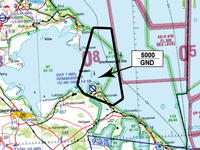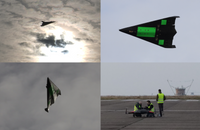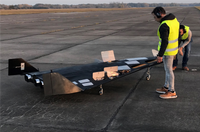POLARIS tests spaceplane demonstrators at Peenemünde Airport
28.-31.10.2022
From Friday 28th to Monday 31st of October, POLARIS conducted a 4-day flight campaign at the Airport of Peenemünde on the Baltic Sea.
While previous demonstrator flight test campaigns took place at the local airport of Rotenburg/Wümme close to Bremen, POLARIS now requires a significantly larger airspace for high performance testing.
Peenemünde Airport has been selected for flight testing due to its unique geographic conditions. The Airport is the only aerodrome in Germany that offers a long runway (2.5 kilometers) directly heading towards the sea, without having settlements in the approach corridor or close to the airport.
For the first time POLARIS required a dedicated restricted airspace for flight testing due to higher vehicle weights and longer range flights. A corresponding application for the implementation of a restricted airspace (ED-R) was approved by Deutsche Flugsicherung (DFS) and the Federal Ministry for Digital and Transport (BMDV). The new ED-R “Peenemünde” was finally created in late October.
The ED-R Peenemünde has a maximum extension of 27 by 14 kilometers and covers approximately 260 square kilometers. POLARIS is the holder of the ED-R, which initially exists for several weeks and can be activated/deactivated via NOTAM. When activated for POLARIS flight testing, no other aircraft is allowed to enter the ED-R.
The demonstrators ALEDA (Demo-2) and ATHENA (Demo-3), both with a total length of 3.5 m, were based at the airport during the campaign. ALEDA is a comparatively lightweight vehicle, while ATHENA, which was built under contract with the Bundeswehr, is significantly more powerful with a nominal take-off mass of 120 kg.
During the campaign, ALEDA conducted a total of 13 flights, operated by world-class drone pilots Niels Herbrich and Christian Hidde. All flights proceeded perfectly without encountering a single issue. Also, take-off and landing on the relatively rough runway surface of the airport went smoothly in all flights. The main purpose of the flights was to investigate flight stability and to identify and adapt flight controller parameters. ALEDA, which accomplished its first flight just 3 weeks earlier in Rotenburg, has now conducted 16 successful flights.
Due to a dense fog layer developing on Sunday afternoon, ATHENA could not yet conduct its first flight, planned for Sunday/Monday, as the operation license of the vehicle requires clear visibility over a distance of at least 5 kilometers.
With more favourable weather conditions forecasted, POLARIS has already scheduled the next test flight in Peenemünde.
This October 2022 campaign forms the first out of a series of flight campaigns at Peenemünde Airport in 2022 and 2023 with demonstrators of quickly increasing size and performance. These demonstrators will pave the way to future spaceplane-based access to space from Germany and Central Europe, using conventional runways, rather than classical launch pads.
POLARIS would like to express their deepest gratitude to Dr. Thomas “Tom” Lamla, owner and CEO of Peenemünde Airport, for his fantastic support in all matters, and for enabling the use of his unique airport!
Also many thanks to all parties involved in the ED-R application and implementation process, including the Office of Prof. Giemulla and Dr. van Schyndel, Deutsche Flugsicherung (DFS), Federal Ministry for Digital and Transport (BMDV), as well as the Bundeswehr.


